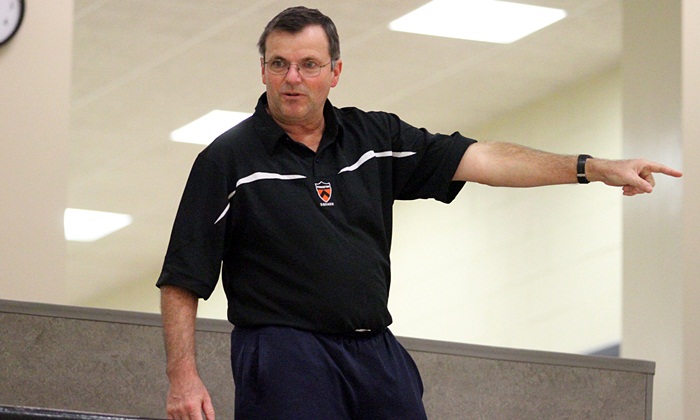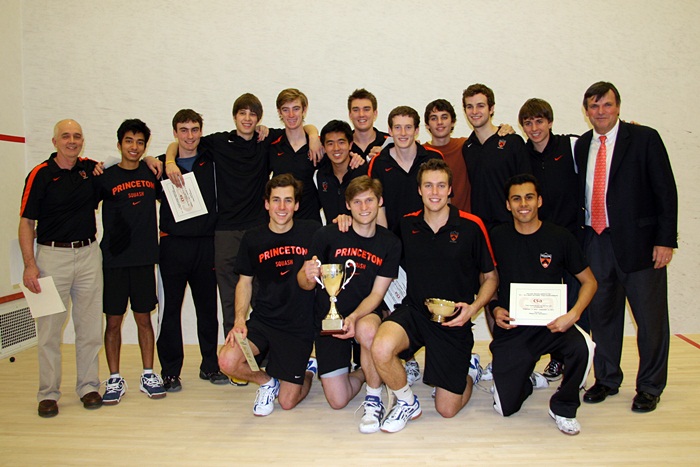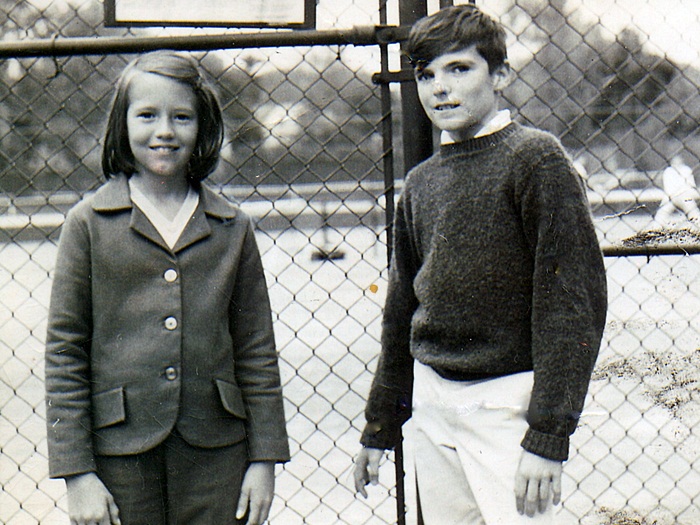As part of the Celebration Of 120 Years Of Princeton Squash event during the second weekend in October, DailySquashReport.com editor Rob Dinerman was asked by the Princeton squash committee to write a tribute to the coaching career of its longtime men's coach Bob Callahan, which was presented to Callahan (with copies handed out to all of the more than 200 attendees) during the Saturday evening festivities. It capped off a memorable week for Callahan, who had been inducted into the U. S. Squash Hall Of Fame several days earlier during the U.S. Open tournament in Philadelphia.
A Tribute To The Career Of Princeton Men’s Squash Coach Robert W. Callahan
by Rob Dinerman

October 12th, 2012 ---- When Princeton scored a thrilling 5-4 victory over Trinity College in the final round of the 2012 Potter Cup before a delirious packed-to-the-rim Jadwin Gymnasium crowd this past February 19th, thereby ending Trinity’s record-shattering 13-year reign as intercollegiate national team squash champions, it marked the most significant achievement in the 82-year history of Princeton squash. The milestone triumph constituted as well the apex of head coach Bob Callahan’s 31 years at the Tiger helm, providing a compelling impetus for the highly-popular and perhaps-overdue decision several months later by U. S. Squash to induct him into its Hall Of Fame.
During the Callahan coaching era, Princeton has won two national team championships (previously in 1982, his rookie season as coach, when the team went undefeated wire to wire); earned the postseason national title four times (in 1982, 1988, 1993 and 2012); and captured the Ivy League crown on 10 occasions (1982, 1989, 2000, 2002, 2003, 2006-2009 and 2012), including in eight of the past 13 years. Highlighting that latter category were the four-straight years in the second half of the decade of the 2000’s when the team, led by the Class of 2009’s “Three Amigos” group of Mauricio Sanchez, Kimlee Wong and Hesham El Halaby, built upon their Ivy League conquests by also reaching the Potter Cup final all four years, only to be stopped each time (and twice, in 2006 and 2009, at Jadwin in agonizing 5-4 fashion) at that precipice juncture by Trinity.
All of those bittersweet memories were washed exultantly away on that gloriously sunny Sunday afternoon last winter when a determined, talented and extraordinarily well-coached Princeton squad, buoyed by their home-court environment, inspired by the hundreds of vocal supporters shoehorned into every inch of available space in the gallery, and unfazed by either a week-old 7-2 road loss to Trinity or the four matches to two deficit facing them after the second tier of Potter Cup final-round matches had concluded, was able to seize the opportunity and roll through the remaining three matches (reversing the prior week’s outcomes in the cases of both No. 4 Kelly Shannon, who won the last match on court, and No. 1 Todd Harrity) in what became a memorable closing sprint, with the increasingly adrenalized spectators roaring their approval at every successful Tiger salvo.
Princeton’s ability to come through in the clutch at every defining moment of this enormous moment in the annals of intercollegiate squash --- with No. 6 Clay Blackiston, trailing 2-1, eking out an 11-9 fourth game en route to his eventual win; No. 7 Dylan Ward, up 2-1 but behind 9-8 in the fourth, responding with a match-ending three-point spurt; and Shannon erasing a substantial first-game deficit and winning that crucial game 13-11 --- is a reflection of Callahan himself. The latter’s own outstanding playing career, often overlooked due to the success he would later attain as a coach, was based on both his noteworthy stroking skills and mastery of squash’s fundamentals (areas he relentlessly hones in his players through extensive drilling and in-court refinements) and an admirable competitive attitude, combined with an ability even as a collegian to focus at crunch-time to a degree that is rare in someone that young, and a flair for late-match rallies.
During his sophomore year, as one example, playing at No. 3 on a Princeton team that was facing also-undefeated Yale in New Haven in a crucial late-season dual meet, Callahan trailed Eli captain Seth Walworth, two games to love and later 13-9 in the fifth, yet managed to win in overtime, a key match in Princeton’s victory and the undefeated 1974-75 season that it ensured, Princeton’s first in 20 years. Several years later, Callahan trailed Peter Talbert, two-love and 4-1 in a third-game best-of-nine tiebreaker (i.e. quadruple-match-point down) in the semifinals of a strong invitational event at the Broad Street Club in New York before rallying to rescue that game en route to a 3-2 triumph that preceded a final-round win, also in five games, against Billy Ramsay, the younger brother of Princeton’s long-time (since 1994) women’s head squash coach Gail Ramsay. And in 1989, when the U. S. Nationals were held at Jadwin, Callahan entered the 30-and-over draw, which he annexed with a comeback final-round win over Steve Fortunato, the shot-making specialist (and 30-and-over Nationals winner two years earlier) who led two games to one prior to Callahan eking out a crucial fourth-set tiebreaker and then winning a close but convincing fifth game.
Throughout Callahan’s high-school years at Episcopal Academy, he was a significant member of some of the strongest varsities fielded by any American school in the history of high-school squash ---- the Page brothers, Palmer, David and Tom; the Havens brothers, Peter and John; and the Bottger brothers, John and David, played on those early-1970’s teams, as did Joe Swain and Gil Mateer, ALL of whom were destined for prominence as collegians, providing Episcopal’s coach Darwin Kingsley (later the Executive Director of U. S. Squash, which was known as the USSRA at the time) with an overabundance of wealth, a string of InterAC titles and a host of undefeated seasons, often largely characterized by 7-0 tallies in dual-meet competition against the remaining Philadelphia-area private schools like Chestnut Hill, Penn Charter, the Hill School and Haverford. Unlike many of his teammates of that period, Callahan was also on the tennis team, which would later be true of his college years as well.
His four years on the Princeton squash varsity were marked by similar success beginning right from his freshman year, when he evinced a calmness and maturity level that impressed the returning lettermen. That 1973-74 season saw Callahan and teammates like Arif Sarfraz, Hollis Russell, Dave Scamurra and the Bottgers end a long (44 straight team dual-meet matches over a five-year period) Harvard undefeated streak with a 5-4 road victory, their first over the Crimson in eight years and only the second Princeton conquest in Harvard’s intimidating Hemenway Gymnasium since before World War II. This breakthrough outcome gave them a share of the Ivy League championship for the first time since 1957, following which the Tigers, as noted, went undefeated (10-0) and were outright Ivy League champions in 1975; won the postseason six-man team tournament in 1976; and again were 10 for 10 and Ivy League champs in 1977, Callahan’s senior year, when he was team captain. All in all, Princeton’s dual-meet record over the four years was 35-2. Callahan frequently played at No. 1 during his junior and senior years, ascending as high as No. 5 in the intercollegiate individual rankings and winning the Intercollegiate C-Division title (for the Nos. 5 and 6 players) at the end of his sophomore season.

2012 National Championship Team
After his college graduation in May 1977, Callahan was well along in a budding business career in IBM’s Manhattan office, having married the former Kristen Hanson in 1979 and seemingly solidly positioned himself to pursue a traditional white-collar path. When he accepted an offer to coach at Princeton in the wake of Norm Peck’s retirement during the summer of 1981, it was with the intention at the time of coaching for just that one 1981-82 season; officially, Callahan was still at IBM and merely taking a one-year sabbatical. But that campaign proved so successful (11-0, national champions) and fulfilling, and Callahan made such a smooth and enjoyable transition (not easy to do given how close he still was in age to the players he was coaching), that at the end of that year, after some soul-searching and plenty of support from his wife, he opted to leave his well-paying position at IBM in the rearview mirror and make a permanent commitment to Princeton, a decision for which both he and his alma mater have forever been grateful.
Those early-1980’s teams featured Tom Shepherd ’86, the first of nine Callahan protégés to earn all-Ivy designation in each of their four years; Rob Hill ’84, who teamed with Andy MacDonald to win the U. S. National Doubles his senior year and later became a four-time U. S. Nationals winner and President of the World Pro Squash Association; and Bill Ullman ’85, who as a senior was the recipient of the George C. McFarland Jr. Squash Award for his contributions to the team. As that decade moved along, Keen Butcher ’88 and Jeff Stanley ’89 singularized the Princeton program when they faced off in the finals of both the 1987 U. S. Nationals and the 1988 Intercollegiate Individuals (both won by Stanley, though Butcher would later earn U. S. Nationals titles in 1995 and 1996), while Callahan --- who would similarly be happily sidelined 15 years later when two of his players, namely Yasser El Halaby and Will Evans, contested the 2003 Individuals final --- contentedly watched from the gallery, unburdened by any coaching responsibilities and secure in the knowledge that by that juncture of the 1988 tourney his charges had already clinched the six-man team title for that season.
The 1992-93 squad that also captured the end-of-season Potter Cup tournament was paced by Rick Hartigan ’95, Alex Cristiani ’93, David Kay ‘95, later a top-10 pro on the ISDA pro doubles tour; David Steere, who three years later would win the New York State Open title; Chuck Goodwin ’93, whose unexpected first-round straight-set victory over three-time Intercollegiate champion Adrian Ezra keyed his run to the semis of the prestigious Harry Cowles Invitational that winter; Alec Decker, who won the deciding match on court in a 5-4 final-round victory over Harvard, with all of the other matches having ended before his fifth game began; and Jack Wyant ’96, who at season’s end became one of 12 Princetonians during Callahan’s tenure to receive Ivy League Rookie Of The Year honors, and who for the past several years has been one of Callahan’s opposing counterparts as the men’s and women’s squash coach at Penn.
Shortly thereafter (at the beginning of the 1994-95 season), college squash switched from hardball to softball, a move that Callahan strongly backed during the heated discussion among the college coaches preceding their decisive vote. The dominance that Trinity College has exerted, beginning with the 1998-99 season and extending all the way until Callahan’s charges finally (and climactically) wrestled the Potter Cup trophy away from its 13-year captivity in Hartford this past February, hasn’t been easy for any of their main rivals to endure, but it must be said that throughout that lengthy skein the biggest challenge that the Bantams have faced has consistently been brought by Princeton, which actually defeated Trinity, four matches to one, in the 2002 USSRA Five-Man Team Championships (in Hartford, no less) and was Trinity’s Potter Cup final-round opponent in 2002, 2003, 2004, 2006, 2007, 2008 and 2009.
In five of those seven years, the only exceptions being 2004 and 2006, Princeton went undefeated against everyone else, and the four players from the class of 2003 --- namely David Yik, the 2001 Intercollegiate Individual champion, whose older brother Peter ’00 won that same title in 1999 and 2000; Eric Pearson, who won the Ivy League title-deciding match in 5-4 wins over Yale in 2002 and Harvard in 2003 and who later won the U. S. Nationals three-straight years from 2008-10; Will Evans, Intercollegiate Individuals runner-up in 2002 and 2003; and team co-captain Dan Rutherford --- that won three Ivy League titles brought special distinction to Princeton squash, as of course also did Yasser El Halaby ’06, the only male player to win the Individuals all four years (Coach Ramsay is the only female player to accomplish the feat), and the Three Amigos trio that headlined the Class of 2009. Stanley, the Individuals champ his sophomore and junior years, Yasser El Halaby and the Yik brothers were recently joined in the list of Individuals champions that Callahan has coached by the current Tiger captain Harrity, who after reaching the final as a freshman in 2010, rolled through the 2011 draw without the loss of a single game, a feat that brought to 10 the number of years in which a Callahan-coached player has won this coveted title.
Yet as impressive as these on-court achievements have been, they may have been exceeded by the impact Callahan has had on those who have played for him and on squash in the United States, both at the college level and beyond. He has been innovative almost to the point of being visionary on a number of fronts. During the summer of 1982, just months after the conclusion of his first season as coach, Callahan launched the first set of week-long summer squash camps in conjunction with the USSRA and the Princeton-based racquets and apparel company Head, which invited promising teenage players from every major region in the country and which became the prototype for the summer junior and adult squash camps that have subsequently proliferated throughout the nation.
The following season, he became the first coach to schedule an in-season team visit overseas (in that case to London), a squash-and-sightseeing expedition that had such a positive effect in expanding his players’ horizons (on both the squash and the cultural fronts) that every four years the team embarks on a similar trip (to Cairo in 2007 and to Aix-En-Provence in 2011), as do most of the other top squash college squads as well, a time-line that ensures that every student generation will have the opportunity to participate in this experience. He arranged to have Princeton host the biennial World Junior Men’s Championships in 1998, the first time that this major tournament had ever been held in America. And, as noted, his was an important voice when the colleges made the change from hardball to softball during the mid-1990’s.
Much of the reason that Callahan was able to have such an influence on a decision that was strongly opposed in many circles stemmed from the reputation that he had by then deservedly acquired among his colleagues for absolute integrity and for putting the greater good of the game ahead of narrow self-interest. Several coaches from the rival schools noted that such was the level of faith that they placed in Callahan that he was even entrusted to handle such sensitive tasks as constructing the postseason tournament draws and determining the seeding and rankings without anyone else proctoring or questioning his decisions; another example of the respect that he earned among his counterparts from the other colleges lies in the frequency with which they elected him to serve as an officer of the College Squash Association, including several terms as President (he also sits on the Squash Council of the National Urban Squash and Education Association, the umbrella organization for the inner-city youth foundations that have blossomed throughout the U. S.). The tournaments that Callahan chaired were known for being professionally run and for having a “big-time” feel to them that wasn’t always present at other sites, and whenever a thorny issue crops up during the tournament weekends, his opinion is often sought and acted upon.
Perhaps most praiseworthy of all is the extent to which Callahan’s ability to maintain his poise and personal compass has relentlessly persisted even in the face of a plethora of nail-biting matches going in both directions that might well have overwhelmed almost anyone else. There have been a host of occasions over the years in which his Princeton teams have been at the absolute threshold of what would have been a huge team win, only to be denied by an improbable eleventh-hour rally at the last possible instant (just as there have been some last-second WINS for Princeton as well with defeat staring them in the face), and Callahan has been able to handle both outcomes, in some cases with a whole year’s worth of work and hope hinging on a few capricious swings of the racquet, with remarkable calm, class and dignity.
Even at the moment of his greatest triumph this past February, amidst the waves of elation swirling all around him, Callahan, refusing to celebrate too openly in front of the defeated Bantams, insisted that his players show respect and acknowledgement for the opponents that they had finally conquered. As one coach stressed in an interview for this article, if anyone has fully lived up to the Rudyard Kipling quote prominently posted in the Wimbledon locker room about experiencing victory and defeat and “treating both impostors just the same,” it is Bob Callahan.
Indeed, these twin themes of character and balance permeate the descriptions of colleagues and alums alike, justifiably so in light of the reliability he has shown and the loyalty he has reciprocally earned, whether to his college or in his complete devotion to his family and to the five sons that he and Kristen have proudly raised, all of whom (namely Greg ’05, Tim ’07, Scott ’08 and the twins Matt and Peter ‘11) are Princeton graduates who played in the squash program, with Tim and Scott both cracking the starting nine.

Gail Ramsay and Bob Callahan, circa 1965
The 20 years that Neil Pomphrey --- a Scottish-born physicist who recently ended a 28-year tenure at the Princeton Plasma Physics Laboratory --- has served as assistant men’s coach speak volumes for themselves; the bond that the two men have formed goes far beyond the normal head coach/assistant coach relationship. And one of the great personal squash stories in intercollegiate annals is that of how Callahan and Gail Ramsay, childhood friends and neighbors who first met in the mid-1960’s when they used to practice on the tennis courts at the Cynwyd Club within easy walking distance from their suburban-Philadelphia homes, were reunited in the mid-1990’s as fellow holders of the reins of the men’s and women’s squash teams at Princeton. For the past 18 (and counting) years they have harmoniously worked side by side, dividing up the court time, co-directing the Princeton Squash Training Center and tallying a combined total over the past half-dozen years of six Ivy League titles (four men, two women) and four national team championships (three women, one men) that no other school can match.
They also collaborated beautifully in October 2001 in a “Celebration Of 100 Years Of Princeton Squash” (the men’s varsity debuted in 1932, the women’s in 1972, hence 100 COMBINED years of Princeton squash) that turned into a smashing success and drew hundreds of former letter-winning squash alumni from every corner of the world to Jadwin Gymnasium to commemorate the occasion; a 120-year sequel celebration is planned for October 2012.
It is a tribute to both of them that each underwent a major leg operation --- in the form of a hip-replacement procedure for Callahan in 2002 and arthroscopic knee surgery for Ramsay in 2006 ---and then proceeded in the very next season to coach their respective teams to a national title, namely the Howe Cup, emblematic of the women’s college team championship, in Ramsay’s case and the USSRA Five-Man Team event (as well as the Ivy League crown) in Callahan’s. The happiest people when the news emerged of Callahan’s selection for the U. S. Squash Hall Of Fame were Ramsay herself, along with Pomphrey, Trinity Coach Paul Assaiante, who will be Callahan’s “presenter” at the induction ceremonies and who, despite the rivalry between the two schools, considers Callahan “like my brother,” and most of all, the hundreds of players that he coached and mentored and whose lives he profoundly changed. Universally admired throughout the sport, often to a degree that borders on reverence, Callahan has truly established himself as a man for all seasons --- especially the squash season.
Rob Dinerman wishes to express his gratitude to the many people who aided his efforts in writing this tribute to Bob Callahan, beginning with Coach Gail Ramsay, who approached him with the article topic and made sure to provide him with all the logistical support he needed; Coach Neil Pomphrey, for the exceptionally informative pair of lengthy telephone interviews he granted; Callahan’s fellow college head coaches Paul Assaiante (Trinity) and Bill Doyle (Harvard), who similarly were enthusiastic interview participants; and the host of Callahan’s former high-school and college teammates, as well as many of the Princeton players he coached, whose information, reminiscences, anecdotes, perspective and opinions, conveyed in phone and personal interviews as well as email exchanges, constitute the essence of this document.
Back To Main


